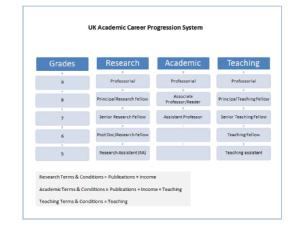Career Pathways
Staying in Academia |
Other Options in Research, Higher Education, or Career Change |
| As you'll be aware, academia is one of the most competitive fields. The number of suitably qualified and experienced researchers far exceeds the academic jobs available. In some disciplines the path to full time lectureship involves years of fixed term research contracts. For others, research becomes a career – and end – in itself.
If you’re at the start of your research career and nursing ambitions to become a fully-fledged academic, it’s important to plan ahead and think strategically. You have to take control of your career from the earliest stage and keep the end goal in mind. It’s no good getting to the end of your second postdoc only to find you’ve had limited success with bid applications, have little administrative experience and a teaching portfolio. Before you decide to remain in academia, ask yourself: A good place to start is An Academic Career - a resource developed by Manchester University Postgraduate Careers team. If you have the drive, determination and talent to succeed, then a career in academia can prove to be extremely fulfilling and despite the gloom there are researchers who make a successful transition from contract research to permanent post. In terms of your own prospects, there are some factors beyond your control, but success will depends mainly on your ability to do the following: Building your research profile You will need a healthy publications record to be considered for lectureships. Aim for high impact, well recognised journals. You will need to be strategic, so consider possible collaborations with highly cited academics. UK universities are concerned with impact, so quality trumps quantity. Cultivate your professional, academic network and take every opportunity to share your work. Networking is a reciprocal activity, so try to establish a connection and a dialogue with your peers. Join Academia.edu and try to enhance your online profile through selected activity on LinkedIn and Twitter. Developing your research trajectory Think about the direction and development of your research. Is there a clear purpose and vision tied to a research strategy? If not, you’ll find it difficult to convince an academic selection panel. Find – or create – opportunities for collaborative working, joint projects of interdisciplinary initiatives. Gaining teaching experience Discuss your professional development needs with your line manager/supervisor/PI. Seek out any opportunities to lecture. If there are no immediate openings, explore other avenues (time allowing) through IATL. Don’t assume lecturing is the only means to develop your teaching experience: lab demonstrations, problem-based classes and seminars all provide exposure to students and the chance to hone your teaching style. Teaching and Learning courses from LDC A proven track record in securing funds and grants will strengthen your case at the application stage, as funding is a high priority for departments. If you’re at the beginning of your research career, then your first step may to support more established colleagues with their bids or apply for smaller funding sources (e.g. travel grants or running internal events). Where to find jobs Further resources
|
Research / Higher Education / Career Change
ResearchMany researchers leave the familiar surroundings of university to pursue research careers in both the private and public sector. Researchers across all disciplines find challenging and stimulating roles in R&D, banks, local and central government departments, and the cultural sector. Where to find jobs Further resources
Higher Education
|

